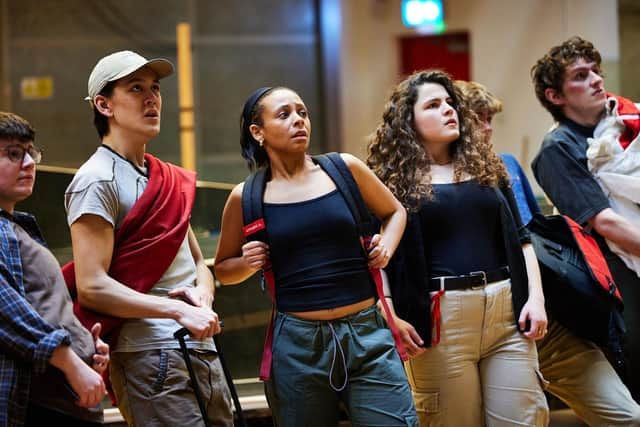New production at Leeds Playhouse of William Golding classic Lord of the Flies
If there’s a more passionate proselytiser for theatre and its potential to capture hearts and change minds, I am yet to meet them. This spring Leach is at the helm of Lord of the Flies at Leeds Playhouse, the theatre where she is deputy artistic director. In recent years she has staged Macbeth, Hamlet, Oliver Twist, A Christmas Carol – she specialises in big, bold productions in which her hallmarks are clarity of storytelling and an epic sweep. Audiences can’t help but be caught up in the productions; her enthusiasm for her work is easy to feel from the stage.
It will, one imagines, be in evidence in spades in the upcoming production of Lord of the Flies. In a break from rehearsal, Leach explains why she was drawn to this show and why it works for the Leeds theatre for now; as deputy artistic director she has a wider responsibility than just the shows she directs, she has to think about the theatre as a whole. “From a programming point of view it’s a really interesting piece for us to be staging. This time last year I was directing Macbeth and watching all those teenagers in the auditorium engaging with it was absolutely glorious,” she says. “We wanted to find a text that would really speak to those school groups – of course it’s not just for young people, but it does particularly speak to them. I have been thinking for some time about what those big epic stories are that interrogate humanity that we can put on our stages and this seemed like the perfect fit.”
Advertisement
Hide AdAdvertisement
Hide AdLord of the Flies is the William Golding 1954 classic that tells the story of a group of British children stranded on a desert island following a plane crash. The boys – they are all boys in Golding’s book – find themselves building a society, with leaders, heroes and victims on the deserted island as tensions for power and the battle for survival consumes the group.


Leach is particularly drawn to the piece as a parent seeing her child heading off to ‘big school’. “Having a child who is 11 and has just gone off to high school, something we ask ourselves as parents is what kind of world is he about to experience,” says Leach. “One of the things you grapple with is asking how do you stand up and be a good person and this text absolutely explores that, it asks what would you do to stand up for someone who needs defending and I feel like I am particularly drawn to questions like that in this moment.”
The Golding estate is quite protective of the text, so Leach’s version uses a famous and authorised adaptation, but she has made casting decisions that means it’s not an entirely white, male company, and will reflect a contemporary Britain. Of course Golding’s story is supposed to hold a mirror up to society. While Ralph, Jack, Piggy and their fellow stranded classmates are all school age teenagers, their story is an allegory for the rest of the world and the power structures within which we all operate. “The play is a thought experiment. It’s asking us to look at our world, but Golding created this bubble for us to examine our world and questions what we want to create as a society.”
For the set Leach has worked with Max Johns who has created what Leach describes as ‘an abstraction of a desert island’. She later walks me through the set being built in the Playhouse’s workshop area. “It’s an abstracted version of paradise,” says an excited Leach as she shows off black palm trees that tower over us. One of the other reasons for Leach’s enthusiasm is because she knows how much this matters. “The theatre experiences I had as a teenager, watching shows or being involved in youth theatre, they were completely transformative and I want to share that experience with others,” she says. “I consider it a huge honour and responsibility to make work that will be seen by lots of young people. I have this imaginary sign in the back of my mind that says ‘don’t be boring’. For a lot of young people they might only go to the theatre once a year and if this show is their one opportunity to experience theatre then we have to get it right and we cannot afford to be boring. When you get it right and you are in a theatre with a group of other humans and connected, it’s like a drug.”
Leeds Playhouse, to April 8.